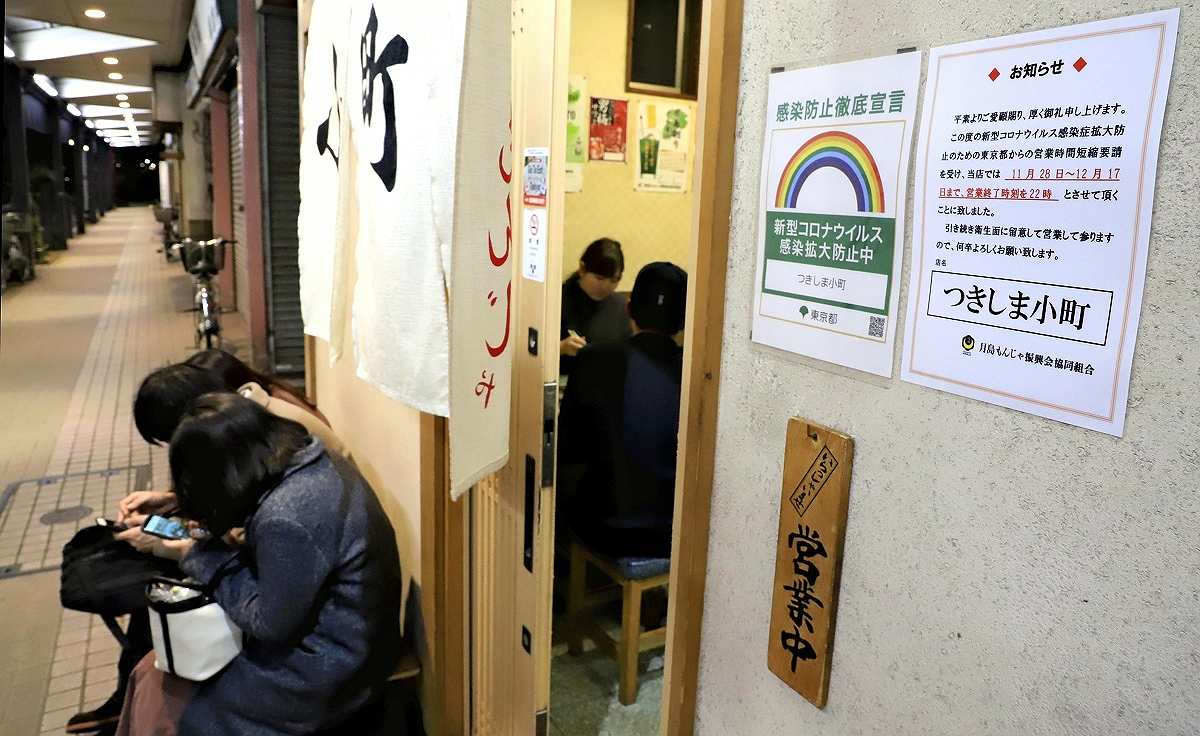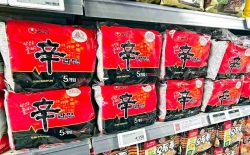
A monja pancake restaurant is seen in Tsukishima, Tokyo, on Saturday night, with a sign announcing that it will be open until 10 p.m. in response to the Tokyo metropolitan government’s request for shortened hours.
10:20 JST, November 30, 2020
“This is the third time I’ve accepted the request for shorter hours,” said Masayuki Hirano, manager of the NST branch of Osio, a monja pancake store with six locations in Tokyo’s Tsukishima. “It’s rough, but it can’t be helped.”
It’s a little after 8 p.m. on Saturday and the restaurant is only about 30% full.
In response to the recent surge of the novel coronavirus, the Tokyo metropolitan government issued a request for restaurants and other facilities that serve alcohol to shorten their operating hours starting Saturday.
Similar requests were made in the spring and summer. The current appeal will remain in effect until Dec. 17, putting it squarely in conflict with the year-end party season. Some restaurants are trying to think of ways to attract customers even under the strict conditions of closing by 10 p.m.
At Osio, 8 p.m. would usually be a busy time with groups filling the place. But this year, there have been almost no reservations, perhaps because of the general mood of restraint along with the request for shorter hours.
“It’s a tough situation, but the regulars are still showing up,” Hirano said. “We want to serve our customers in a style in which they can enjoy themselves when there are only a few of them.”
Resistance from some
It is notable that some establishments have actively resisted the request this time.
The Shinbashi 4-chome Tavern Wattsuri is continuing its normal business hours, while maintaining infection prevention measures such as placing disinfectant at the entrance.
According to the manager, December is an important time when it can expect 1.5 times as many customers as usual. “We cooperated the past two times because we had a chance to catch up in December.” he said, revealing the hardship. “This time it is difficult.”
Instead of a time for going wild with the traditional year-end party, this has become a season for exercising patience. Given the circumstances, both restaurants and companies are scrambling for ideas.
Tokyo-based Sapporo Lion Inc, which operates the Ginza Lion beer hall, has shortened the length of its normal banquet course from 120 minutes to 90 minutes. “We’re striving to allow people to enjoy eating and drinking with peace of mind,” the company said.
Mellow, which develops business opportunities that involve automobiles, has proposed open air year-end parties using food trucks.
The Tokyo-based company said it thought customers would enjoy eating and drinking outdoors to keep from being in crowded situations, as long as they have heaters and heavy clothing to protect from the cold. Some customers held small-scale end-of-year parties without waiting for December.
Nixing the company party
According to a nationwide survey by Tokyo Shoko Research Ltd., 88% of companies will not hold a year-end or New Year’s party this season.
Of that figure, 67% said they held a party last year but will not hold one this year. “In the midst of the coronavirus crisis, all companies are being cautious to protect their employees and corporate image,” a representative said.
The survey was conducted on Nov. 9-16, among 10,000 companies.
On the other hand, a survey by Nippon Life Insurance Co. of 25,000 people in October found that 66% of teleworkers feel that “communication through drinking” in the workplace is “necessary” or “somewhat necessary,” 11 percentage points higher than the overall average.
According to Prof. Makoto Ueno of Nara University, a culture similar to modern parties, in which officials gathered to drink together, emerged in Japan in the 8th century Nara period.
“People have been drinking, eating and dancing together since ancient times to form a society,” Ueno said. “It is possible to enjoy banquets with small numbers of people while taking thorough measures to prevent infection and using online services.”
Top Articles in Society
-

Man Infected with Measles May Have Come in Contact with Many People in Tokyo, Went to Store, Restaurant Around When Symptoms Emerged
-

Australian Woman Dies After Mishap on Ski Lift in Nagano Prefecture
-

Woman with Measles Visited Hospital in Tokyo Multiple Times Before Being Diagnosed with Disease
-

Foreign Snowboarder in Serious Condition After Hanging in Midair from Chairlift in Nagano Prefecture
-

Record-Breaking Snow Cripples Public Transport in Hokkaido; 7,000 People Stay Overnight at New Chitose Airport
JN ACCESS RANKING
-

Japan Institute to Use Domestic Commercial Optical Lattice Clock to Set Japan Standard Time
-

Israeli Ambassador to Japan Speaks about Japan’s Role in the Reconstruction of Gaza
-

Man Infected with Measles May Have Come in Contact with Many People in Tokyo, Went to Store, Restaurant Around When Symptoms Emerged
-

China Eyes Rare Earth Foothold in Malaysia to Maintain Dominance, Counter Japan, U.S.
-

Prudential Life Insurance Plans to Fully Compensate for Damages Caused by Fraudulent Actions Without Waiting for Third-Party Committee Review






















